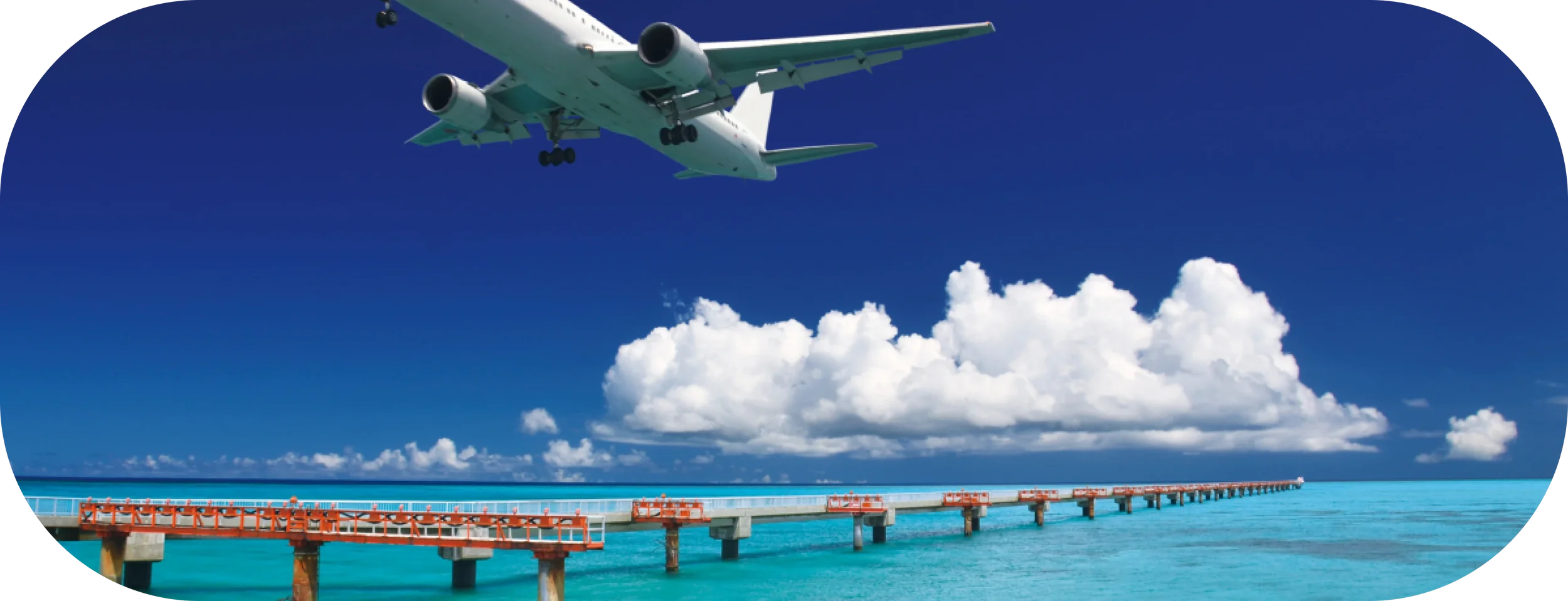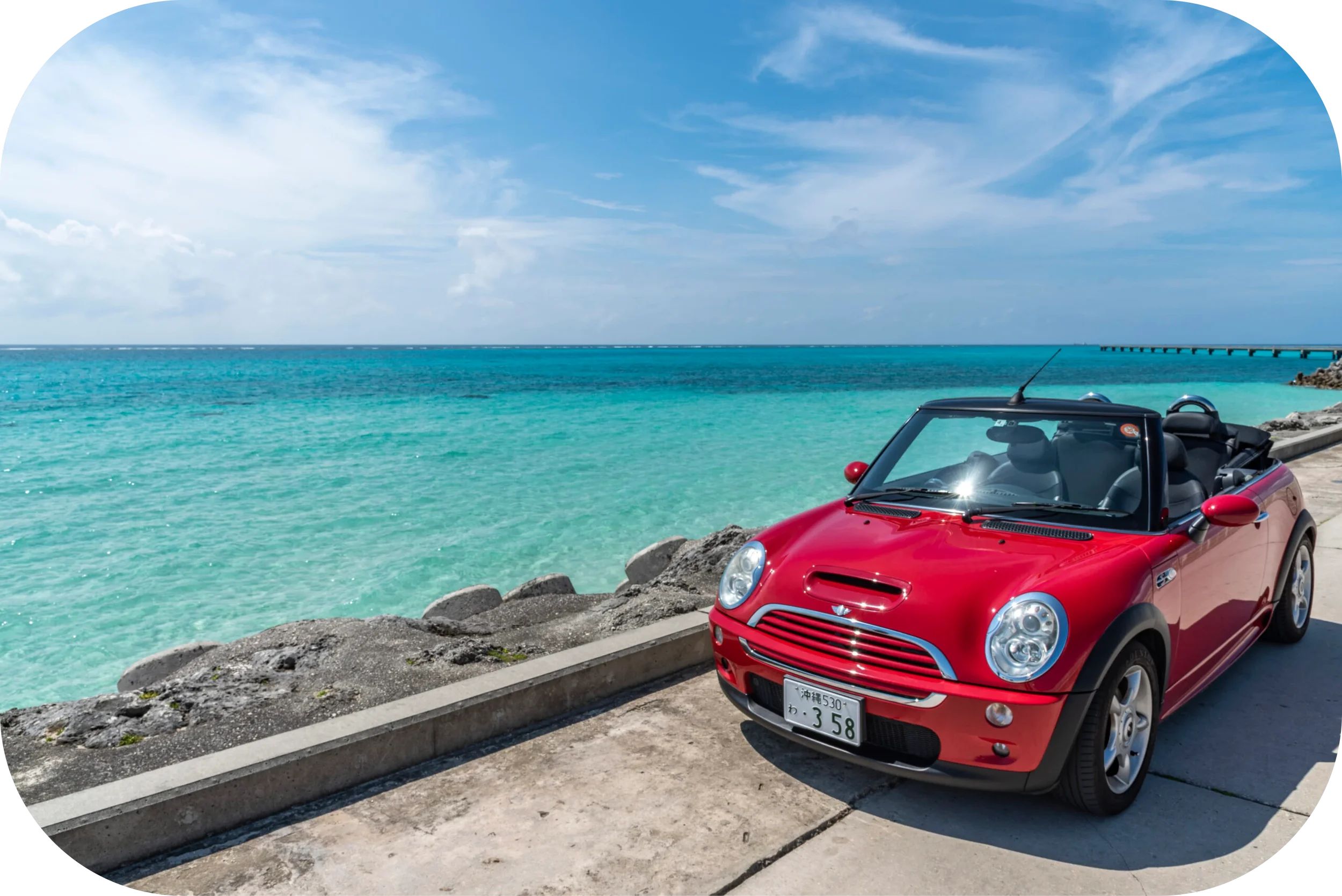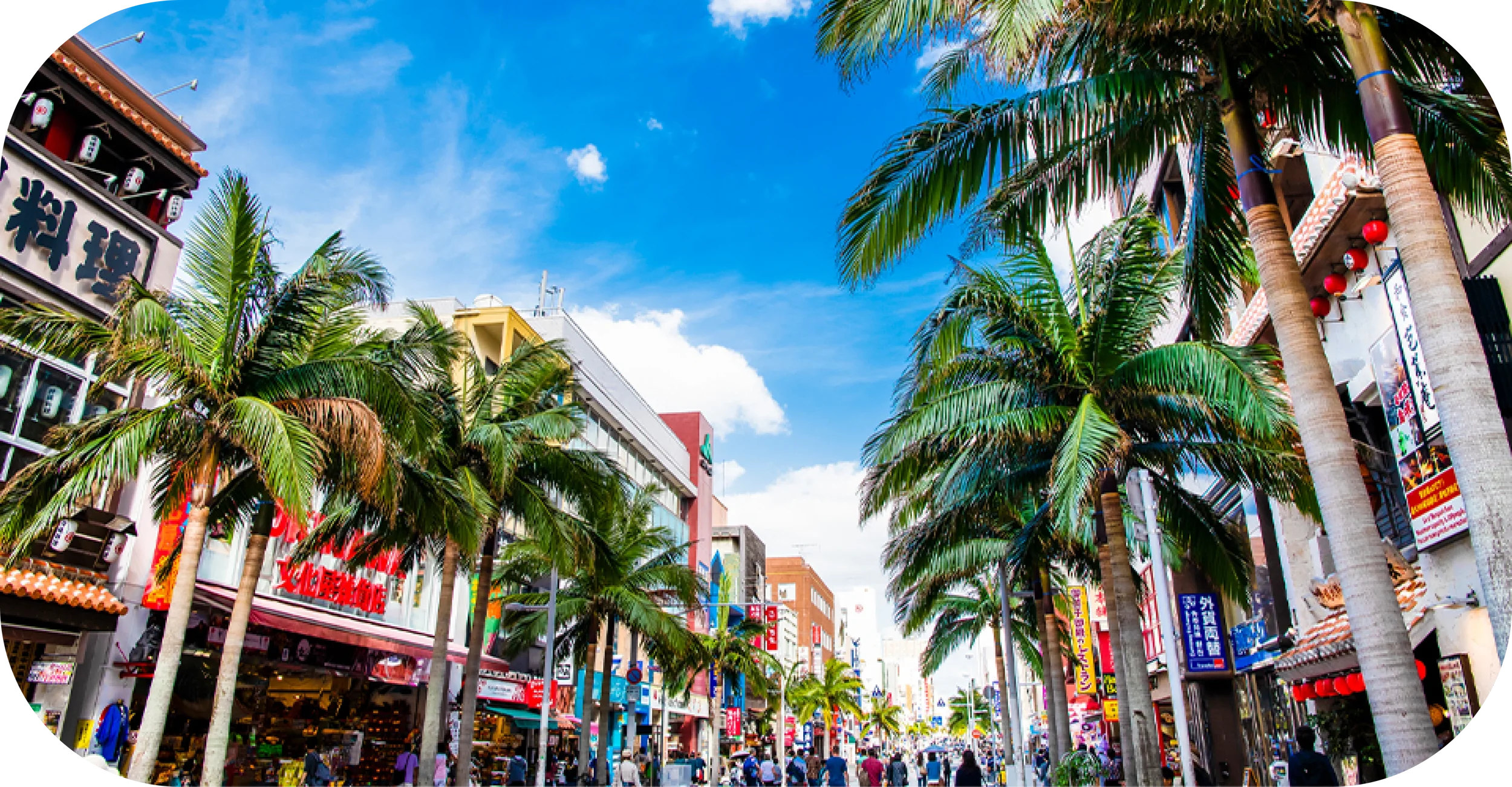How to Find Cheap Flights to Okinawa, Japan
Cut your costs with local routing tricks, smarter booking windows, and fee-proof comparisons for Naha, Ishigaki, and Miyako.
At-a-Glance: Booking Windows & Seasonal Trends
Best Booking Windows:
- Domestic Japan: Book about 2–8 weeks in advance for good deals.
- International (short-haul Asia): ~2–3 months ahead.
- International (long-haul US/Europe): ~5–6 months ahead.
Don’t wait until the last 3 weeks—prices jump sharply.
When to Avoid (Peak Travel):
- Golden Week: late April–early May
- Obon: mid-August
- New Year: late Dec–early Jan
- Silver Week: late September (in some years)
- Summer School Holidays: late July–Aug
Cheapest Times:
- Late January–February (historically cheapest)
- Early June (rainy season)
- Late Sept–Nov (excluding holiday weeks)
Cheapest Days: Depart Tue/Wed/Thu where possible; return Mon/Tue.
Quick Booking Reference
| Origin/Destination | Recommended Booking Window | Notes |
|---|---|---|
| Within Japan (domestic) | 2–8 weeks ahead | Early-bird discounts; flash sales ~1–2 months out common. |
| East & SE Asia → Okinawa | 1–3 months ahead | Book earlier if traveling during regional holidays. |
| Long-Haul → Okinawa | 3–6 months ahead | Earliest side of window for peak season. |
Seasonal Demand Overview
| Month / Period | Demand Level | Fare Impact & Notes |
|---|---|---|
| Late Apr – Early May | Peak | Golden Week, highest fares. |
| Mid August | Peak | Obon festival week. |
| Late Dec – Early Jan | Peak | New Year holidays. |
| Late Jan – February | Low | Cheapest historically. |
| Early June | Low | Rainy season. |
| Late Sept – Nov | Med-Low | Shoulder season; avoid Silver Week. |
Note: “Silver Week” occurs in years when multiple September holidays align.
1. Understand Okinawa Flight Options (Airports & Routes)
Okinawa Prefecture has multiple airports that receive flights, but the main gateways are:
Naha (OKA) – Largest airport in Okinawa, located on Okinawa Main Island.
Handles the most domestic and international flights. Common gateways: Tokyo (HND/NRT), Osaka (KIX/ITM), Fukuoka (FUK), Nagoya (NGO), plus East Asia hubs (TPE, HKG, ICN).Ishigaki (ISG) – Serves the Yaeyama Islands.
Direct flights from Tokyo, Osaka, and a few East Asian cities. Smaller scale than Naha but can save time for outer island trips.Miyako (MMY) / Shimojishima (SHI) – Serve Miyako Islands.
Domestic flights from Tokyo and Osaka; some international LCC connections from Hong Kong and Seoul.
Tip: If visiting multiple island areas, consider open-jaw tickets (e.g. fly into ISG, out of OKA) to avoid backtracking. Some LCCs and full-service carriers make this easy.
2. Price Drivers & Timing
Seasonality:
- High fares: Golden Week, Obon, New Year, domestic 3-day weekends.
- Low fares: Late Jan–Feb, early June, late Sept–Nov (outside holidays).
Advance Purchase:
- Domestic: 2–8 weeks ahead often works best.
- International: 2–6 months out for best fares; book earlier for peak dates.
Flash Sales:
Both LCCs and full-service airlines occasionally offer 48-hour promotions with deeply discounted fares. Sign up for airline newsletters or follow on social media for alerts.
Oil & Currency:
International fares can fluctuate with fuel surcharges and exchange rates.
3. Routing Strategies to Lower Prices
Hub-Hop:
Fly to a major Japan hub (Tokyo, Osaka, Fukuoka) on the cheapest international fare, then book a separate domestic LCC leg to Okinawa.Open-Jaw / Multi-City:
Example: Into ISG, out of OKA. Saves time and sometimes money versus a round-trip to one airport.Nearby Airports Filter:
Search NRT/HND/KIX/ITM/FUK/NGO together; for East Asia, include TPE, HKG, ICN.Extra Connection:
Adding a connection can drop fares, but balance savings against travel time.
Example:
NYC–Seoul on sale, then Seoul–Naha separately on a low-cost carrier, often cheaper than NYC–Naha on one ticket.
4. Tools & Workflows (Step-by-Step)
Google Flights:
- Use calendar view to scan cheapest dates.
- “Track prices” to get alerts.
- Multi-city builder for open-jaw routes.
- Toggle “nearby airports” to widen searches.
Meta-Search (Skyscanner/Kayak/Momondo):
- Whole-month scan.
- “Everywhere → OKA/ISG/MMY” to spot deals.
Airline Direct Sites:
- Flash sales.
- Member-only promo codes.
- 24-hour free holds (where available).
Alerts Stack:
- Set multiple alerts for routes + nearby gateways.
- Label with target prices.
Points & Miles:
- Avios/JAL/BA/AA sweet spots for domestic Japan.
- ANA/Star Alliance for partner awards.
- Use positioning flights + separate award tickets.
Automation:
- Calendar blocks to check fares twice a week.
- Spreadsheet for price logging.
5. LCC vs Legacy: The True Total Cost
Legacy (JAL/ANA/etc.):
- Higher base fare, but includes free bag, free seat, better IRROPs handling.
LCCs (domestic & regional):
- Lower base fare, but paid bags/seats, stricter change rules.
Fee Math Checklist:
- Checked bag cost.
- Seat selection.
- Payment and airport check-in fees.
- Priority boarding.
- Change/cancel fees.
When LCC Wins:
- Short trips with personal-item only.
- Shoulder dates.
- Early flash sales.
When Legacy Wins:
- Peak weeks.
- Tight connections.
- Typhoon season buffers.
6. Best Months & Fare Calendars (Practical)
Cheapest Windows (Historically):
- Late Jan–Feb.
- Early June (rainy season).
- Late Sept–Nov (excluding holiday weeks).
Avoid:
- Golden Week.
- Obon.
- New Year.
- Domestic 3-day weekends.
Embed: Month-by-month “likelihood to save” bar to visualize cost patterns.
7. Baggage & Seating Policies (Don’t Lose Savings)
Carry-On Limits:
- LCCs: Strict 7 kg total limit (including personal item).
- Legacy: 10 kg limit, more lenient enforcement.
Checked Bags:
- Legacy: 20 kg free.
- LCC: Paid (~¥2,000 online, higher at airport).
Special Items:
- Dive gear included in weight allowance on legacy carriers.
- LCCs may charge oversize fees.
Seat Selection:
- Legacy: Free seat choice.
- LCC: Paid (~¥500–¥1,500), bundled in upgrade packs.
Family Seating:
- Legacy tries to keep families together.
- LCC: Pay to guarantee seating.
8. Weather & Disruption Playbook
Typhoon Season (July–Oct):
- Monitor Japan Meteorological Agency.
- Airlines may allow free changes if advisory issued.
- Build at least a 1-day buffer for onward connections.
If Flight is Canceled:
- Full refund or free rebooking.
- Seats may be limited post-typhoon—act fast via app, phone, or counter.
Stranded:
- Hotels may fill quickly; secure extra nights early.
- Airlines usually won’t cover weather-related accommodation—check travel insurance.
Alternate Routes:
- Consider other Okinawa airports if available.
- Occasionally routing via Taiwan/Korea is faster after major disruption.
Other Weather:
- Rainy season delays possible.
- Winter fog rare but can divert flights.
9. Cash vs Points: When to Redeem
Miles for Domestic Flights:
- Avios: 9,000 points one-way on JAL (~¥3 tax).
- United/ANA partners: 8,000 miles one-way.
Airline Explorer Passes (Tourists):
- JAL Japan Explorer Pass: ¥7,700–¥14,300 fixed fares.
- ANA Experience Japan: ~¥13,000 anywhere in Japan.
Asia Mileage Programs:
- Cathay Asia Miles, KrisFlyer may offer good value for short-hauls.
Credit Card Portals:
- Redeem at fixed value for LCC fares not covered by miles.
Combination Strategies:
- Mix miles and cash.
- Open-jaw: use miles one-way, cash return.
When Not to Use Miles:
- Save points when cash fares are very low (e.g. off-season LCC sale).
10. Ethical & Policy Notes
Hidden-City Ticketing (Skiplagging):
- Risky and not recommended.
- Bags checked to final city.
- Potential airline penalties.
Separate Tickets & MCT:
- Leave large buffers (3–4 hrs domestic, overnight if possible for intl).
- Insurance may cover missed connections in some cases.
Visa/Transfer Rules:
- Ensure entry/transit compliance for third-country routings.
Respect Local Rules:
- Avoid booking resident-only fares.
- Support local Okinawan businesses.
Flexible Ticket Strategies:
- Use refundable fares as placeholders while hunting deals.
11. Regional Playbooks
From Japan (Domestic):
- Monitor flash sales.
- Fly midweek.
- Use JAL Explorer or ANA Experience Japan for last-minute affordability.
From East Asia:
- Compare LCC vs full-service.
- Use multi-city to combine Okinawa with mainland Japan.
- Sign up for regional airline promos.
From SE Asia:
- Compare direct vs hub in Japan + domestic LCC.
- Example: SG → Tokyo (Scoot), Tokyo → Naha (Peach).
From NA/EU/Oceania:
- Cheapest to major Japan hub, then domestic.
- Consider open-jaw or stopover.
- ZIPAIR + domestic LCC as a hybrid option.
12. Sample Itineraries
Max-Savings:
- Overnight at hub.
- Early LCC to OKA.
- Return via JAL Explorer Pass.
Balanced:
- Legacy to Tokyo.
- Domestic award to ISG.
- Return from OKA.
Family-Friendly:
- Fewer changes.
- Legacy carrier with included bags.
- Build typhoon buffer days.
FAQ
Q: When is the cheapest time to fly to Okinawa?
A: Late Jan–Feb, early June, late Sept–Nov (outside holidays).
Q: How far in advance should I book?
A: Domestic 2–8 weeks; Intl 2–6 months (earlier for peak).
Q: Is it cheaper to route via Tokyo/Osaka?
A: Often yes, especially with LCCs for the domestic leg.
Q: Which airport is cheapest?
A: Naha (OKA) usually; ISG/MMY/SHI can be higher.
Q: Which days are cheaper?
A: Tue/Wed/Thu departures; Mon/Tue returns.
Q: Do baggage fees erase LCC savings?
A: Sometimes; calculate all-in costs.
Q: Best way to set price alerts?
A: Google Flights + Skyscanner + airline newsletters.
Q: Can I use points?
A: Yes—Avios, ANA/United miles, and tourist passes are good value.
Q: Typhoon impact?
A: Refund or free change if canceled; build buffers.
Q: Safe buffer for separate tickets?
A: 3–4 hrs domestic; overnight intl.
Q: Google Flights vs OTA?
A: GF for search; book direct or trusted OTA.
Q: Are flash sales common?
A: Yes—watch LCCs and occasional JAL/ANA promos.





